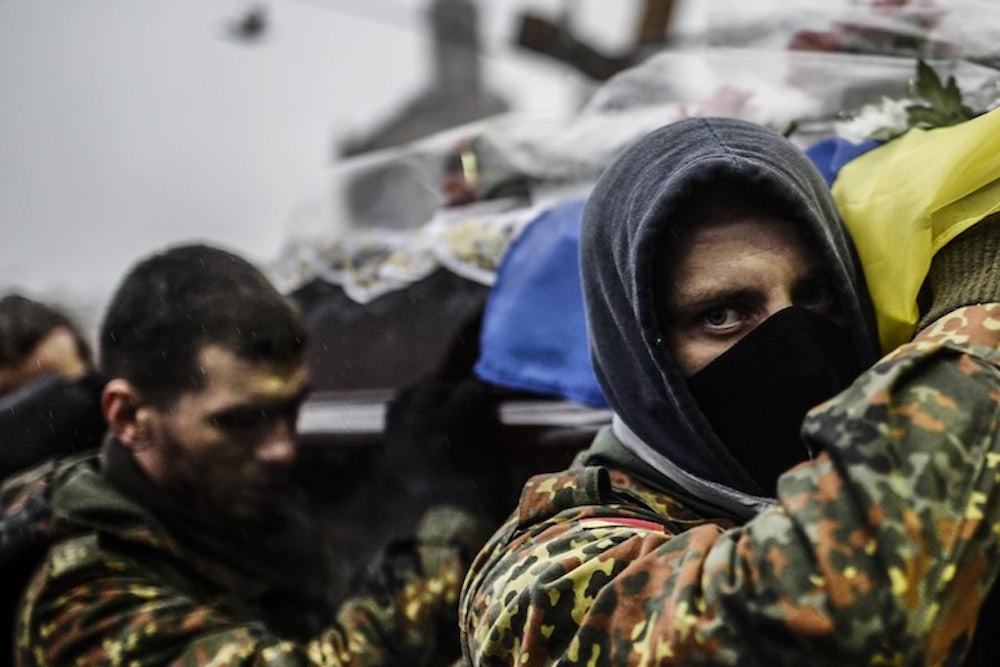LVIV, UKRAINE — I don’t know if anybody in Ukraine is able to think of President Yanukovych’s overthrow as a victory. I don’t know if anybody feels any sense of joy or triumph. Perhaps most people feel like I do, with tears welling up in their eyes every time they hear the word “Maidan.” The faces of the dead, the fates of the maimed.
The horrors of recent days at the Maidan have now migrated from TV and computer screens into the nightmares of post-traumatic stress disorder. A friend of mine used to go hiking in the mountains with Yuri Verbitsky, a seismologist and mountain climber from Lviv who had just received his PhD in physics. Yuri was among the first victims of the Maidan terror. He was kidnapped from the hospital and dragged out into the woods, where he was horribly tortured and then left, his legs bound with scotch tape, to freeze to death in the twenty-degree cold. He lived in the building next to mine. Now when I walk by I see his face looking out at me from every window—like all of the victims, his picture has been placed in windows, on fences, on façades, candles kept aflame before him. It gives me goose bumps every time.
Another friend of mine just laid to rest her own best friend, who was shot a couple of feet away from her on February 20 at the Maidan. My friend's life was saved by her camera: The bullet shattered its lens instead of her face.
My brother-in-law joined the protests at the Maidan back in the beginning of December. He would travel from Lviv to Kiiv, spending several nights in a row standing guard, and then returning. He was there, defending the Maidan, on the worst days of the terror, and then he left for far-away Kremenchug, where he laid to rest a friend of his who had died on the Maidan, returning to Kiev after Yanukovych had fled.
The March 1 massacre of the Kharkiv activists at their Main Square was intended to show the world that the people of Kharkiv would not recognize Ukraine’s new leaders, that they want nothing to do with Europe, that all they want is to be Vladimir Putin’s subjects. Among the people of Kharkiv who came out to say the opposite was a sweet kid with a big imagination named Vlad Zubenko, a railworker who in his spare time liked to reenact medieval battles with his colleagues. Vlad donned a real suit of armor, then, and set off to defend the Maidan. But medieval armor doesn’t do much good against a Kalashnikov rife, and Vlad Zubenko was killed, at the age of 22.
Many of the wounded of Kiev were taken home, since the hospitals were surrounded by pro-Russian militia, and then transported to the West. Doctors in European hospitals bemoan that broken limbs have already begun to grow into the body, so that they will have to be rebroken, among other horrendous complications now being suffered by the sick who were not able to be treated in time. These doctors are shocked—they’ve never seen anything like this before.
The only people who haven’t yet awoken to the truth of the Maidan are the dictators: the ex-dictator of Ukraine, a puppet, and the current dictator of Russia, who believed he pulled the strings on everyone. They use the selfsame tactics time and time again—intimidation and deception, and yet lately, the more they tried to intimidate the people of Ukraine, the more people rebelled, went out into the streets. They provoked the people more and more, and all it did was reinforce the people’s solidarity.
When the government blocked the bank accounts of the charities supporting the Maidan, the people began to use social media to arrange the transfers of private funds for medicines and other provisions for the protesters. When the hospitals became dangerous, the Maidan did its best to organize an underground hospital where doctors from around the world volunteered to treat the wounded, and the people paid out of pocket for the best technologies available for their fallen comrades.
When the pro-Russian militias and the mercenary killers broke through the Maidan’s barricades, the people built new and better ones. When the assault continued, all of a sudden, in the middle of the night, the bells of the churches of Kiev rang out an alarm heard across the country, where those sleeping in their homes leaped into their cars and came racing to the aid of the Maidan.
Over the course of this, the longest winter of my life, I have thought a lot about fear. Perhaps the work of overcoming our fear has been the most important thing we have managed to do of late—each of us as able, some on the front lines, some without looking away from the TV or the computer for days on end, overcome by the tragedy but also by the pride that comes from living this moment in this place filled with such incredible, such brave people.
Translated by Jennifer Croft.
